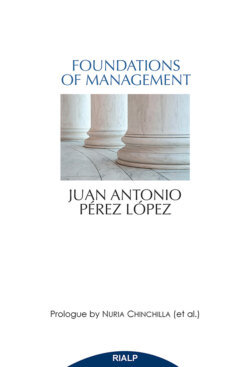Читать книгу Foundations of management - Juan Antonio Pérez López - Страница 18
На сайте Литреса книга снята с продажи.
The psycho-sociological models
ОглавлениеThe consistent confirmation of these observations has led both researchers and businessmen to create a new conception (or paradigm) of how the organization is to be understood. This new conception has meant the appearance of an organic model that transcends and encompasses the simple technical system.
In contrast to the mechanistic conception we have been referring to until now is a psycho-sociological conception. The organization tends to be considered as a social organism in which people take part not only to achieve incentives offered by the company but also to satisfy other needs. Another factor that is considered is that the satisfaction of some of the organization's members will depend on specific interactions with other people within the organization.
In short, a person's motivation to perform a specific task is no longer ascribed to the incentives offered by the company as if they were its sole cause. True, these incentives produce a certain degree of motivation, but when a person carries out his work, he may also discover another series of factors that contribute to generate his motivation.
Thus, the simplistic, mechanistic conception, in which the problem of motivation was reduced to finding incentives (financial or otherwise) to offer him as a stimulus to carry out his work, is replaced by another conception in which it is acknowledged that motivation depends on much more complex factors than incentives offered. Some of these factors have been identified as realities originating in the social interactions that result from the work itself (Hawthorne experiments).
From that time on (we are now talking about the 1940s) a large number of people-academics and managers-abandoned the naive mechanistic conception. Their efforts were now primarily aimed at obtaining a deeper knowledge of the motives that induce people to work and, consequently, the needs that they seek to satisfy in their work.
A clear example of this shift in attitude can be found in the work of Chester Barnard, The Functions of the Executive (perhaps the work that has most influenced modem conceptions of human organizations since it was first published in 1938, with a reprint virtually every two years since), with statements such as the following:
I have found it impossible to go far in the study of organizations or of the behavior of people in relation to them without being confronted with a few questions which can be simply stated. For example: “What is an individual?” “What do we mean by a person?” “To what extent do people have a power of choice or free will?” The temptation is to avoid such difficult questions, leaving them to the philosophers and scientists who still debate them after centuries. It quickly appears, however, that even if we avoid answering such questions definitely, we cannot evade them. We answer them implicitly in whatever we say about human behavior; and, what is more important, all sorts of people, and especially leaders and executives, act on the basis of fundamental assumptions or attitudes regarding them, although these people are rarely conscious that they are doing so2.
Given the authority of Chester Barnard, it is perhaps useful to reproduce something he says in the preface to his book about the experiences that led him to research and write on the subject:
At least this I can assert: though I early found out how to behave effectively in organizations, not until I had much later relegated economic theory and economic interests to a secondary—though indispensable—place did I begin to understand organizations or human behavior in them. I do not mean merely that non-economic organizations—such as the political, the educational, the religious—are also to be found, and are of primary importance; I mean specifically with reference to business organizations that non-economic motives, interests, and processes, as well as the economic, are fundamental in behavior from the boards of directors to the last man. The contrary view is almost always implicit and frequently explicit in the statements not only of businessmen but of labor men, politicians, statesmen, professional men, educators, and even of church ministers. As one result, effective leadership has to be based on intuitions that are correct, notwithstanding doctrines that deny their correctness. Very often, I think, we attempt social integration by methods imposed by a false logic to the very limit that common sense and hard experience will permit.
This maturity in the awareness of the need to research man and what moves him to act in order to formulate a true theory, one able to improve practical action in companies, has guided a multitude of investigations.
The underlying conception in these investigations is no longer the mechanistic but rather what we call the psycho-sociological conception. They all study the business organization as a social organism, in which, obviously, economic goods are produced and distributed, but whose complete reality cannot be visualized or understood if one looks only at processes that take place on the economic level.
